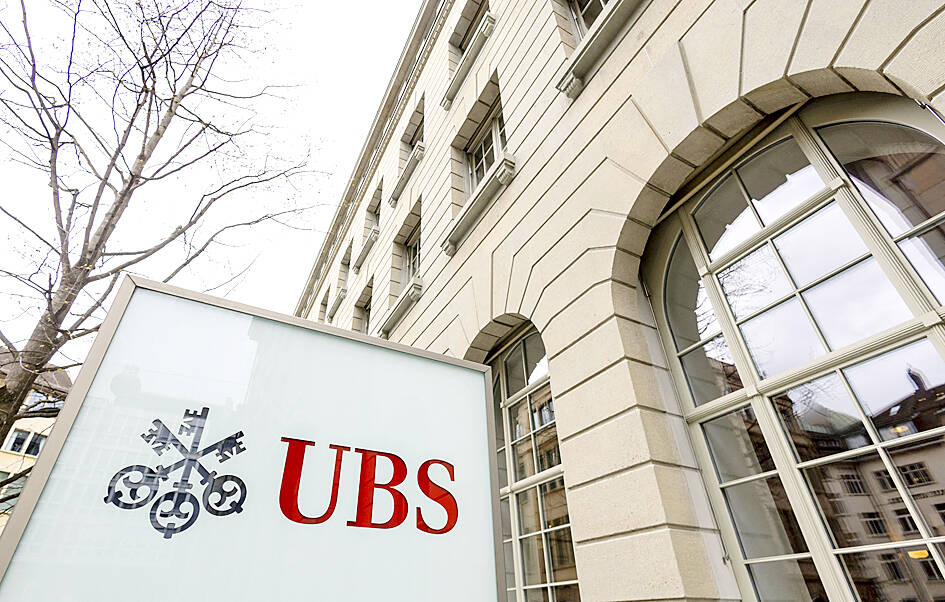UBS Group AG is gearing up for an estimated US$34.8 billion gain as a result of its emergency takeover of Credit Suisse Group AG, while saying that it faces billions in potential legal and regulatory costs from the rescue of its stricken former rival.
The Swiss bank stands to benefit from the combined firms’ negative goodwill, based on a first assessment it has made on data as of the end of last year, it said in a regulatory filing posted overnight in Switzerland.
UBS is also estimating that litigation, regulatory matters and related liabilities could take a bite of as much as US$4 billion out of capital over 12 months.

Photo: Reuters
The figures are based on the bank’s best estimates now, and as further analyses are performed, the figure is likely to change, UBS said.
Bloomberg had previously reported that the bank could make a gain of as much as 51 billion Swiss francs (US$56.8 billion) from the negative goodwill, calculated on the value of Credit Suisse assets at the end of March.
UBS agreed to take over Credit Suisse this year in an emergency sale backed by the Swiss government, amid fears that the smaller troubled competitor was hurtling toward bankruptcy. Analysts have pointed out that Credit Suisse’s local business, Swiss Universal Bank, is probably worth multiple times what UBS paid for it.
Still, if UBS reports a windfall from negative goodwill, many investors are likely to view it as an accounting quirk rather than a sign of strength of the underlying business.
Executives, aware that a paper windfall could prove unpopular in Switzerland, have also been quick to point out the risks they are taking on in an integration that might take several years.
The accounting gain stands to be among the biggest ever reported by a bank in a single quarter, potentially easily surpassing the previous benchmark. JPMorgan Chase & Co’s US$14.3 billion profit in the first quarter of 2021 is the modern record for US and European lenders.
Unlike in more standard acquisitions, UBS was unable to conduct a months-long review of the bank’s books.
UBS has sent in a so-called clean team to assess its former rivals’ client rosters and talent, as well as which business lines should be earmarked for a wind-down unit, people with knowledge of the matter have said.
Credit Suisse had a long list of legal entanglements that might end up costing UBS.

Intel Corp chief executive officer Lip-Bu Tan (陳立武) is expected to meet with Taiwanese suppliers next month in conjunction with the opening of the Computex Taipei trade show, supply chain sources said on Monday. The visit, the first for Tan to Taiwan since assuming his new post last month, would be aimed at enhancing Intel’s ties with suppliers in Taiwan as he attempts to help turn around the struggling US chipmaker, the sources said. Tan is to hold a banquet to celebrate Intel’s 40-year presence in Taiwan before Computex opens on May 20 and invite dozens of Taiwanese suppliers to exchange views

Application-specific integrated circuit designer Faraday Technology Corp (智原) yesterday said that although revenue this quarter would decline 30 percent from last quarter, it retained its full-year forecast of revenue growth of 100 percent. The company attributed the quarterly drop to a slowdown in customers’ production of chips using Faraday’s advanced packaging technology. The company is still confident about its revenue growth this year, given its strong “design-win” — or the projects it won to help customers design their chips, Faraday president Steve Wang (王國雍) told an online earnings conference. “The design-win this year is better than we expected. We believe we will win

Chizuko Kimura has become the first female sushi chef in the world to win a Michelin star, fulfilling a promise she made to her dying husband to continue his legacy. The 54-year-old Japanese chef regained the Michelin star her late husband, Shunei Kimura, won three years ago for their Sushi Shunei restaurant in Paris. For Shunei Kimura, the star was a dream come true. However, the joy was short-lived. He died from cancer just three months later in June 2022. He was 65. The following year, the restaurant in the heart of Montmartre lost its star rating. Chizuko Kimura insisted that the new star is still down

While China’s leaders use their economic and political might to fight US President Donald Trump’s trade war “to the end,” its army of social media soldiers are embarking on a more humorous campaign online. Trump’s tariff blitz has seen Washington and Beijing impose eye-watering duties on imports from the other, fanning a standoff between the economic superpowers that has sparked global recession fears and sent markets into a tailspin. Trump says his policy is a response to years of being “ripped off” by other countries and aims to bring manufacturing to the US, forcing companies to employ US workers. However, China’s online warriors